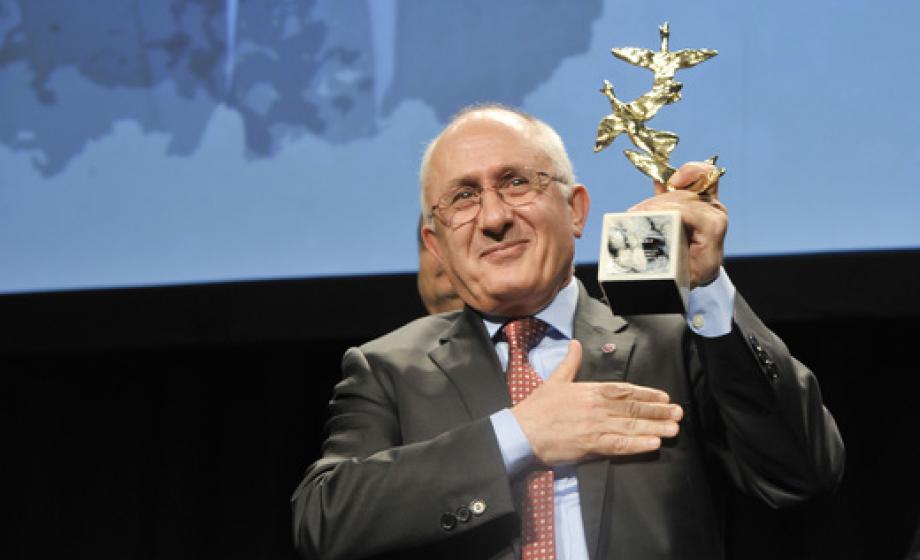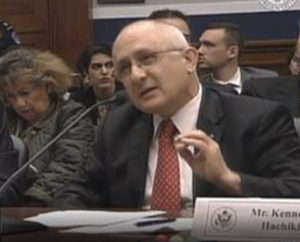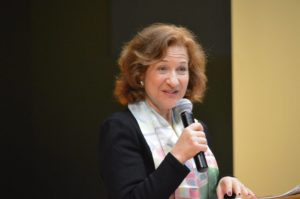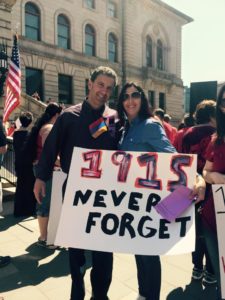
Clark University scholars long have been involved and outspoken about the Armenian Genocide. This spring in particular, as events of 1915 were commemorated and discussed at centenary events and among news media around the world, Clark voices and scholarship shed light on dark historical truths.
Especially busy as a speaker, media source, and honoree was Taner Akçam, history professor and Robert Aram and Marianne Kaloosdian and Stephen and Marian Mugar Chair of Armenian Genocide Studies at the Strassler Center for Holocaust and Genocide Studies.
From May 7 to 9 in Washington, D.C., thousands gathered for the National Commemoration of the Armenian Genocide Centennial, organized by the Diocese and Prelacy of the Armenian Apostolic Churches of America, “to remember those lost in the Genocide 100 years ago and individuals and organizations who put their lives in harm’s way to save others from the Ottoman Empire’s attacks. The Commemoration events served as an opportunity to thank the institutions and individuals who have helped Armenians to survive and thrive, and to promote unity and awareness as a means of preventing future genocides.”
Akçam was honored with a “Heroes of Justice and Truth” award, at a banquet ceremony marking the close of the events.
The award was just one moment in the Turkish-born scholar’s courageous work uncovering historical fact, advocating for openness and opposing denial of the Armenian Genocide. On April 26, Akçam was among dignitaries speaking at a rally attended by several thousand in New York’s Times Square, organized by the Armenian Genocide Centennial Committee of America (AGCCA).

The mass killing of an estimated 1.5 million Armenians during World War I is widely acknowledged as genocide, and just recently was recognized as such by France, Germany and Russia. The Turkish government persists in its long-standing refusal to call the killings genocide, denying the claims as “Armenian lies.” The United States also does not use the term “genocide” in any official communications. “It is still very troubling that the United States has still not recognized this genocide,” Akçam said.
Akçam delivered a passionate speech at the Times Square event, which he wrote was “a very moving moment for me!” The central message, he later wrote, is that “the nation of Turkey consists of more than simply its denialist regime; there is another Turkey, and the citizens of that Turkey are ready to face their history.”
At the rally he said: “Today does not merely mark the centennial of the annihilation of some 1.5 million Armenians; it also marks a century of denial of this crime. The Turkish government continues to deny not merely any responsibility for the horrors inflicted upon Armenian people, but even the fact that it happened at all. As a Turk, it is from this fact that my sorrow and great shame derive.”
On April 23, Akҁam testified before the Commission on Security and Cooperation in Europe, also known as the Helsinki Commission. The hearing was dedicated to the centennial of the Armenian Genocide, “A Century of Denial: The Armenian Genocide and the Ongoing Quest for Justice.” He remarked, “Without truth, there can’t be a peace. … Juxtaposing national interest and morality as being mutually exclusive is just plain wrong.”
Video and full text of Akçam’s speech, “The Other Turkey,” are available online.
Akcam also delivered a talk, “Genocide, Not As An Occurrence But As A Process,” on May 13 at the Brookings Institute Center on the United States and Europe at a conference titled, “Armenians and the Legacies of World War I. “In my talk I tried to develop a macro perspective on the Armenian Genocide,” Akcam wrote, “What I suggested was actually a ‘new’ continuity thesis. I considered the genocide not only as an event that occurred between 1915 and 1918 but also a process that covered the period of 1878 to 1923.”
Strassler Center scholars deeply engaged

Akçam and Strassler Center Executive Director Mary Jane Rein authored an op-ed titled, “Recognizing Armenian genocide an important step for US policy,” which ran in The Boston Globe on April 24.
Strassler Center Director and Rose Professor of Holocaust History Debórah Dwork, a leading authority on university education in the field, was a featured speaker at “Responsibility 2015,” the international conference marking the centennial of the Armenian Genocide, March 13-15 in New York, organized by the Armenian Revolutionary Federation (ARF) Eastern U.S. Centennial Committee, under the auspices of the AGCCA. Khatchig Mouradian, Clark Ph.D. candidate and coordinator of the Armenian Genocide Program at the Center for the Study of Genocide and Human Rights at Rutgers University, where he is also adjunct professor of history and sociology, was a key coordinator of the “Responsibility 2015” conference.

On the Clark University campus, the Strassler Center hosted the Third International Graduate Students’ Conference on Genocide Studies: TEmerging Scholarship in Holocaust and Genocide Studies 100 Years After the Armenian Genocide, in April. The interdisciplinary conference, held in cooperation with the Danish Institute for International Studies, Department of Holocaust and Genocide Studies, Copenhagen, provided a forum for doctoral students to present research to peers and established scholars. Professor Eric Weitz, Dean of Humanities and Arts and Professor of History at the City College of New York, was the keynote speaker. Joining Dwork, Akçam and other guest scholars was Clark Professor Thomas Kühne, Director of Graduate Studies and Strassler Family Chair in the Study of Holocaust History.
In an interview with the Armenian Mirror-Spectator, Dwork said she believes “preparing teachers and writers is the best way to keep the Armenian Genocide important in people’s lives.”
About the Strassler Center
The Strassler Center for Holocaust and Genocide Studies trains scholars, educators, and activists to develop a sophisticated understanding of genocides grounded in scholarship. As the only program to offer a Ph.D. in Holocaust History and Genocide Studies, the Center educates doctoral students to assess the multiple factors that fuel genocides and to formulate policies for political prevention and humanitarian intervention. Grounded in history, the program also draws upon psychology, political science, and geography, all academic strengths at Clark University. The Center’s robust undergraduate program sends a clear signal to colleges across the country about the significance of this subject for all students.


